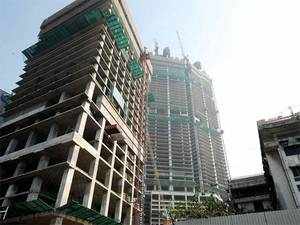Jaypee Wish Town: Homebuyers of Jaypee Wish Town project must get their flats or their money: Supreme CourtPTI|http://economictimes.indiatimes.com/wealth/personal-finance-news/homebuyers-of-jaypee-wish-town-project-must-get-their-flats-or-their-money-supreme-court/articleshow/60926350.cms?utm_source=twitter.com&utm_medium=social&utm_campaign=ETTWWealth
Updated: Oct 03, 2017, 06.39 PM IST

The Supreme Court today observed it wanted to help these investors who must get their flats or their money refunded.
NEW DELHI: Moved by the plight of homebuyers who have not been given the possession of flats despite paying money to builders, the Supreme Court
today observed it wanted to help these investors who must get their flats or their money refunded.
A bench headed by Chief Justice Dipak Misra said this while hearing a plea by over 40 homebuyers of Jaypee Wish Town project at Noida in Uttar Pradesh who have challenged certain provisions of the Insolvency and Bankruptcy Code, 2016.
The apex court, however, said it does not want to have more litigations in such matters.
"We want to help the homebuyers but not litigation," the bench, also comprising Justices A M Khanwilkar and D Y Chandrachud, said.
"We want that homebuyers must get their flats or their money," the court said.
The bench told petitioner's counsel Rashid Saeed that it has already appointed senior advocate Shekhar Naphade as an amicus curiae in the matter pertaining to the insolvency proceedings against real estate major Jaypee Infratech Ltd.
It asked Saeed to file an application for impleadment as a party in the pending insolvency proceedings matter.
The petitioner's counsel said these homebuyers had booked the flats in 2013 and were scheduled to get the possession last year itself.
He said the flats have not been handed over to these buyers despite the fact that they have paid bulk of the amount for the property.
The apex court had on September 11 revived the insolvency proceedings against Jaypee Infratech Ltd and given its management control to the Interim Resolution Professional (IRP), appointed by the National Company Law Tribunal, with immediate effect.
It had restrained the managing director and directors of the company from travelling abroad without permission and asked its parent company, Jaypee Associates, to deposit Rs 2,000 crore with the registry to safeguard the interest of the home buyers.
The top court had also asked Jaypee Infratech to hand over the records to the IRP for drafting a resolution plan indicating protection of interests of over 32,000 hassled home buyers and creditors.
Also Read
Homebuyers of Jaypee Wish Town banking on IRP
Homebuyers of Jaypee Wish Town banking on IRP
What life's like inside Jaypee wish town
Jaypee Wish Town project homebuyers protest at firm's office
Jaypee's Wish Town action plan by July
Updated: Oct 03, 2017, 06.39 PM IST

The Supreme Court today observed it wanted to help these investors who must get their flats or their money refunded.
NEW DELHI: Moved by the plight of homebuyers who have not been given the possession of flats despite paying money to builders, the Supreme Court
today observed it wanted to help these investors who must get their flats or their money refunded.
A bench headed by Chief Justice Dipak Misra said this while hearing a plea by over 40 homebuyers of Jaypee Wish Town project at Noida in Uttar Pradesh who have challenged certain provisions of the Insolvency and Bankruptcy Code, 2016.
The apex court, however, said it does not want to have more litigations in such matters.
"We want to help the homebuyers but not litigation," the bench, also comprising Justices A M Khanwilkar and D Y Chandrachud, said.
"We want that homebuyers must get their flats or their money," the court said.
The bench told petitioner's counsel Rashid Saeed that it has already appointed senior advocate Shekhar Naphade as an amicus curiae in the matter pertaining to the insolvency proceedings against real estate major Jaypee Infratech Ltd.
It asked Saeed to file an application for impleadment as a party in the pending insolvency proceedings matter.
The petitioner's counsel said these homebuyers had booked the flats in 2013 and were scheduled to get the possession last year itself.
He said the flats have not been handed over to these buyers despite the fact that they have paid bulk of the amount for the property.
The apex court had on September 11 revived the insolvency proceedings against Jaypee Infratech Ltd and given its management control to the Interim Resolution Professional (IRP), appointed by the National Company Law Tribunal, with immediate effect.
It had restrained the managing director and directors of the company from travelling abroad without permission and asked its parent company, Jaypee Associates, to deposit Rs 2,000 crore with the registry to safeguard the interest of the home buyers.
The top court had also asked Jaypee Infratech to hand over the records to the IRP for drafting a resolution plan indicating protection of interests of over 32,000 hassled home buyers and creditors.
Also Read
Homebuyers of Jaypee Wish Town banking on IRP
Homebuyers of Jaypee Wish Town banking on IRP
What life's like inside Jaypee wish town
Jaypee Wish Town project homebuyers protest at firm's office
Jaypee's Wish Town action plan by July

